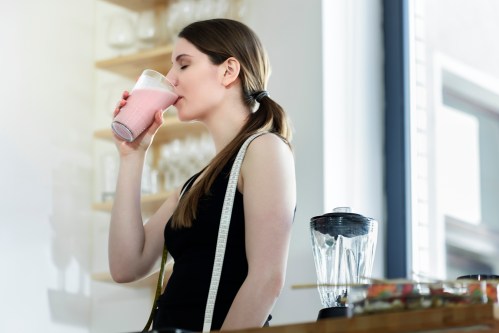Our editors independently select these products. Making a purchase through our links may earn Well+Good a commission
If you’re cutting back on sugar and replacing it with artificial sweeteners, as many people do, I have bad news for you: Those pink, yellow, and blue packets are even worse for you than sugar—and this is coming from me, the guy who calls sugar “the devil.”
While that package of Equal, Sweet‘N Low, or Splenda (yes, even Splenda!) may dump fewer actual calories into your morning coffee, there’s little research to support the idea that this is healthier. The taste of sweet—be it artificial or actual sugar—appears to play a significant role in increasing appetite. (In fact, multiple large-scale studies over the last 30 years have repeatedly found that artificial sweetener users gained more weight or had higher BMIs than those who didn’t use them.)
The taste of sweet—be it artificial or actual sugar—appears to play a significant role in increasing appetite
Here’s the deal: Virtually all the popular, non-caloric sweeteners have one thing in common—they’re significantly sweeter than sugar. Now logically, you’d think all that sweetness would enable you to use less or eat a smaller amount of an artificially sweetened product. But guess what? These super-sweeteners seem to have the opposite effect, in part by flooding your taste buds with sweet, dulling them to the taste, pushing your sweetness threshold ever higher, while never actually satisfying the craving.
Some studies indicate that the super-sweetness of the artificial stuff may interfere with the release of satiety hormones, slowing your body’s ability to send signals to the brain that you’ve had enough—which leads to overeating, without you even realizing it. You could liken it to rapidly downing a few shots of vodka: It takes 15 minutes or so for your body to catch up and send the signals that you’re drunk—and by then, it’s time to take away the keys.
And if that wasn’t bad enough, recent research shows that artificial sweeteners also alter the microbiome and can kill off good bacteria in our gut. In 2014, Israeli researchers demonstrated, in both laboratory animals as well as humans, that glucose intolerance (which sets the stage for full-blown diabetes) is related to changes in the gut bacteria induced by artificial sweeteners.
We now have a whole new respect and understanding of how important a healthy gut flora is for our overall health, extending from immunity to acne to your mood and mental health.
So you have to ask, is all this a good trade-off? No, it’s a crazy one.
I have absolutely seen patients who were completely addicted to artificial sweeteners. In general, we see quite a few patients, many of them from the fashion world, with a terrible Diet Coke habit. I do think most people now know that these artificial sweeteners are terrible for them, but they are addicted and keep coming back for more, even though they know better.
We see quite a few patients, many of them from the fashion world, with a terrible Diet Coke habit
One female patient’s addiction was fueled by her obsession with calorie-counting and her fear of healthy fats. She had terrible headaches, fatigue, and stomach aches and had never put the two together. I put her on a nutritious food plan and used targeted supplementation and acupuncture to help manage her withdrawal symptoms. After a month, her original symptoms were completely gone, and she was finally free from her addiction.
How to stop using artificial sweeteners
With artificial sweeteners, I generally recommend tapering off. If you just quit cold turkey, the withdrawal symptoms can be quite unpleasant: headaches, moodiness, irritability, and strong cravings. I recommend people cut back daily intake little by little, monitoring how you feel until they’re able to cut it out completely. I actually did part of my acupuncture training back in the day at a rehab center for people addicted to heroin and other drugs. Acupuncture can be an amazing tool for helping to deal with any substance addiction.
For a supplement option, L-Glutamine helps stabilize blood sugar levels, which is especially helpful if you are looking to kick your sugar (and artificial sweetener) habit and reduce your cravings. Good luck and good health to you!

A pioneer and internationally recognized expert in the fields of integrative and functional Medicine, Dr. Frank Lipman is the founder and director of Eleven Eleven Wellness Center in New York City and the creator of Be Well by Dr. Frank Lipman, a proprietary brand of dietary supplements, detoxifying cleanses, and health coaching services and a New York Times best-selling author of Total Renewal—7 Key Steps to Resilience Vitality and Long Term Health, Revive—End Exhaustion and Feel Great Again, The New Health Rules—Simple Changes to Achieve Whole-Body Wellness, 10 Reasons You Feel Old and Get Fat and How to Be Well.
This story was originally published on March 31, 2016; it was updated on October 3, 2018.
Sign Up for Our Daily Newsletter
Get all the latest in wellness, trends, food, fitness, beauty, and more delivered right to your inbox.
Got it, you've been added to our email list.











